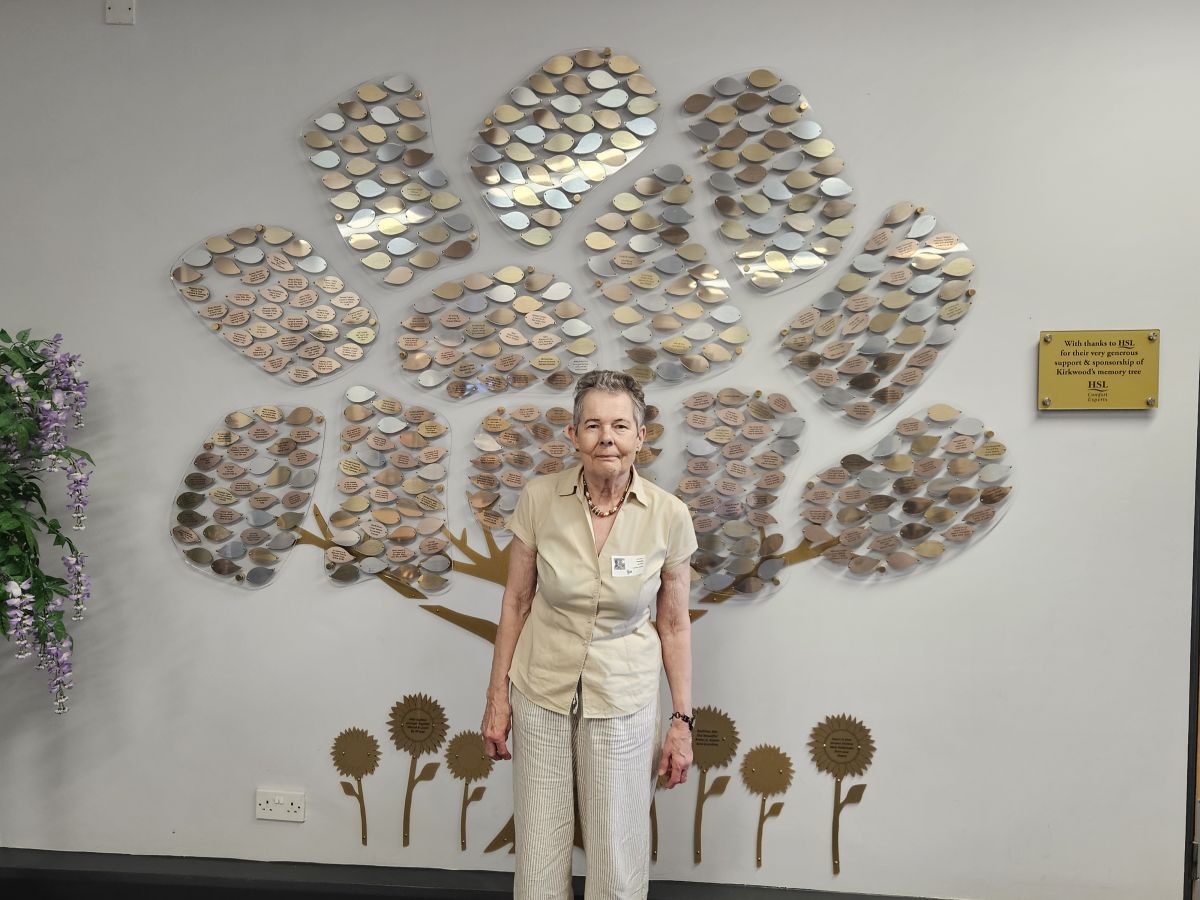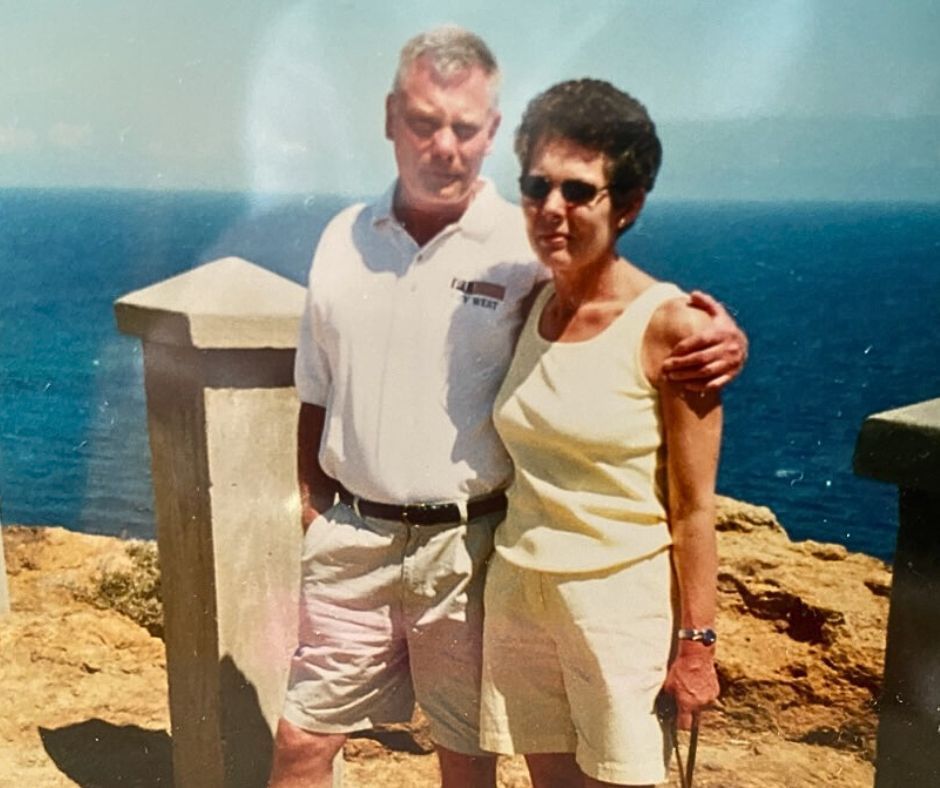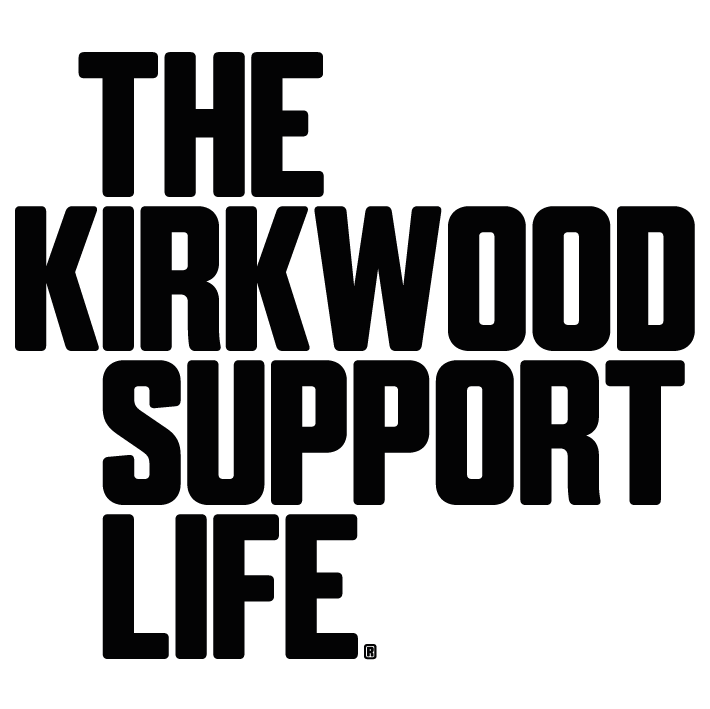22 Jul 2025 Patient and Family Stories
Pam’s Story: How The Kirkwood has cared for me and my husband
Pam Chapman, 73, from Fixby, has cared for her husband Robert through a long and heart breaking journey with Alzheimer’s disease. Drawing strength from her nursing background and the support of The Kirkwood, she shares her honest story in the hope that it might help others facing the same path.
Pam had worked as a district nurse in hospital care. She had known about The Kirkwood for many years through her professional life but it wasn’t until her husband became seriously unwell that she found herself on the receiving end of that care.
“I’ve known about The Kirkwood for a long time. I was a district nurse and before that worked in hospital, so I’d seen the nursing side. But being on the other side of it is completely different.” she said.
Pam and Robert have been married for nearly 52 years. In 2013, after Pam retired, she began to notice small but worrying changes in Robert’s behaviour.
She said: “He was forgetting where things went. I cooked and he washed up, but suddenly everything was going in the wrong cupboards. It was the little things at first, but it added up.”
By 2015, it became clear something more serious was happening. After returning from a short garden holiday in the Netherlands, Pam listened to a series of voicemail messages Robert had left.
“They sounded like he was talking to a receptionist. That’s when I knew it wasn’t just forgetfulness.” she added.
That year, they visited their GP, beginning the long process of referrals, tests and psychiatric assessment. On 6th January 2016, they received a diagnosis: Alzheimer’s disease.
Reflecting on that devastating news, Pam explained: “The psychiatrist said, ‘Go off and enjoy your life.’ At the time, I thought it was a strange thing to say. But now I understand, she knew what was coming.”
Over the next few years, Robert’s condition steadily worsened. In 2018, his psychiatrist advised him to stop driving. Pam said: “He was a driving instructor, but he was getting confused. He didn’t seem to know which direction to go. We changed both our cars, but every time he saw a car outside, he thought he could still drive. I had to show him the letter from the DVLA over and over.”
Despite the challenges, Pam still wanted to make memories. The couple took a short cruise something they’d enjoyed in the past, but it was far from easy.
She said: “I was trying to pack to go off the ship as we had to be off by a certain time. However due to the disease he was trying to get up and wander off and not helping. Luckily, a lady from another cabin came and kept him talking while I packed. On the coach back, he kept trying to stand up. I had to move him next to the window to keep him calm.”

By 2020, Robert had been hospitalised with pneumonia but made a partial recovery. However, in 2022, his condition deteriorated significantly. He became bedbound, non-verbal, and completely dependent on care.
Pam explained: “He can’t walk, can’t talk, can’t feed himself. He’s doubly incontinent. He sleeps a lot now. Sometimes I can get him out in a care chair, but he’s not the person he was.”
In the earlier stages of his disease, Robert was confused and frustrated. He became aggressive and would push Pam if she tried to stop him leaving the house. She said: “He kept thinking he had to go home to his childhood home. He’d try to walk there. A couple of times, he disappeared at night and the police had to come out. I was at the end of my tether.”
Despite her nursing experience, Pam found herself emotionally overwhelmed: “I used to cry on the doorstep at night with a cigarette. I’ve long since quit, but back then that was the only time I let it out.”
One of the most painful moments came when Robert no longer recognised her: “He asked me who I was. I said, ‘I’m your wife.’ I went and got our marriage certificate to show him, but he didn’t seem to believe it. A few days later, he asked, ‘Are you my mother?’ I said, ‘My God, you’ve aged me!’ You have to laugh or you’d cry all the time.”
The turning point came when Pam was referred to The Kirkwood by a senior nurse, after Robert had become bedbound. Pam was initially hesitant, not knowing what to expect.
She said: “Because I was a nurse, I only saw the clinical side. However I did understand it was more than just a place where people come to die. The community Admiral Nurse explained the different services The Kirkwood could provide.”
Soon after, nurse Catherine from The Kirkwood began visiting the home regularly: “She was wonderful. She would kneel down and talk to Robert at his level, not over him. She gave me helpful advice about medication and care. I felt listened to.”
Pam also learned she could access 24/7 support from The Kirkwood team, even outside office hours: “They said, if I needed help, even in the middle of the night, I could ring and someone would be there. That gave me such peace of mind.”

Catherine continued to call Pam every two to four weeks, just to check in: “That phone call means a lot. It reminds you that someone is still looking out for you.”
As someone who has relied so heavily on The Kirkwood, Pam is deeply concerned about the financial pressures facing the charity.
She said: “It’s awful, really. The Kirkwood is vital to our community. People don’t realise how many services you provide, physiotherapy, aromatherapy, counselling, home visits. And you help people with Alzheimer’s, not just those at the very end of life.”
She is especially passionate about telling her story to raise awareness: “If someone else out there is going through what I went through, I want them to know they’re not alone. Help is out there.”
Despite all she’s been through, Pam remains resilient: “You just carry on. If you don’t laugh, you’d cry all the time. That doesn’t help anyone, not you, not your health. I still talk to Robert every day and whilst he can't talk back I know he can still hear what I am saying as he blinks to understand.”
Pam’s story is a powerful reminder that behind every diagnosis is a family doing their best. With the right support, no one should have to face the journey alone: “I just hope that by sharing my story, I can help someone else feel less isolated. The Kirkwood made sure I wasn’t alone and for that, I’ll always be grateful.”
If you need The Kirkwood’s support just like Pam please click the link HERE to find out how we can help you.
Need clinical advice?
Call our advice line on:
01484 557910
24 hrs a day
